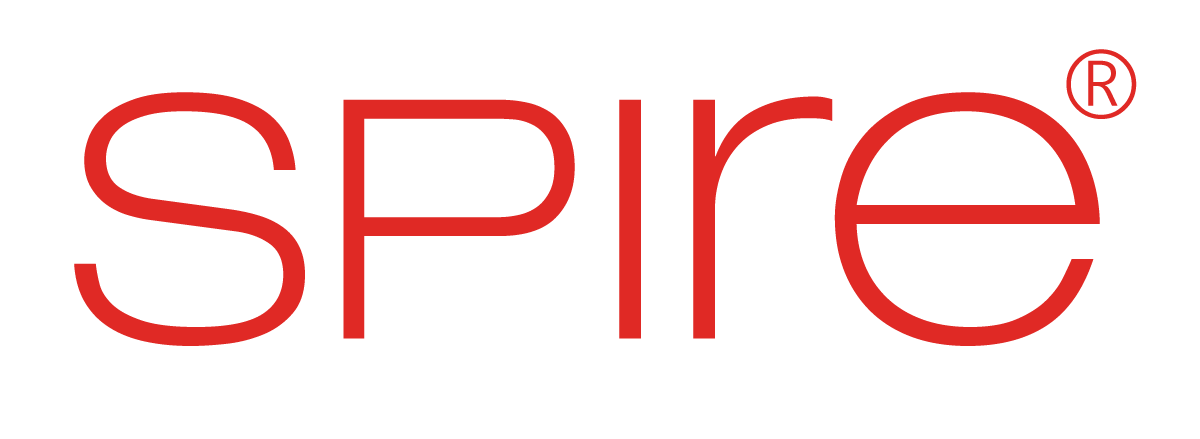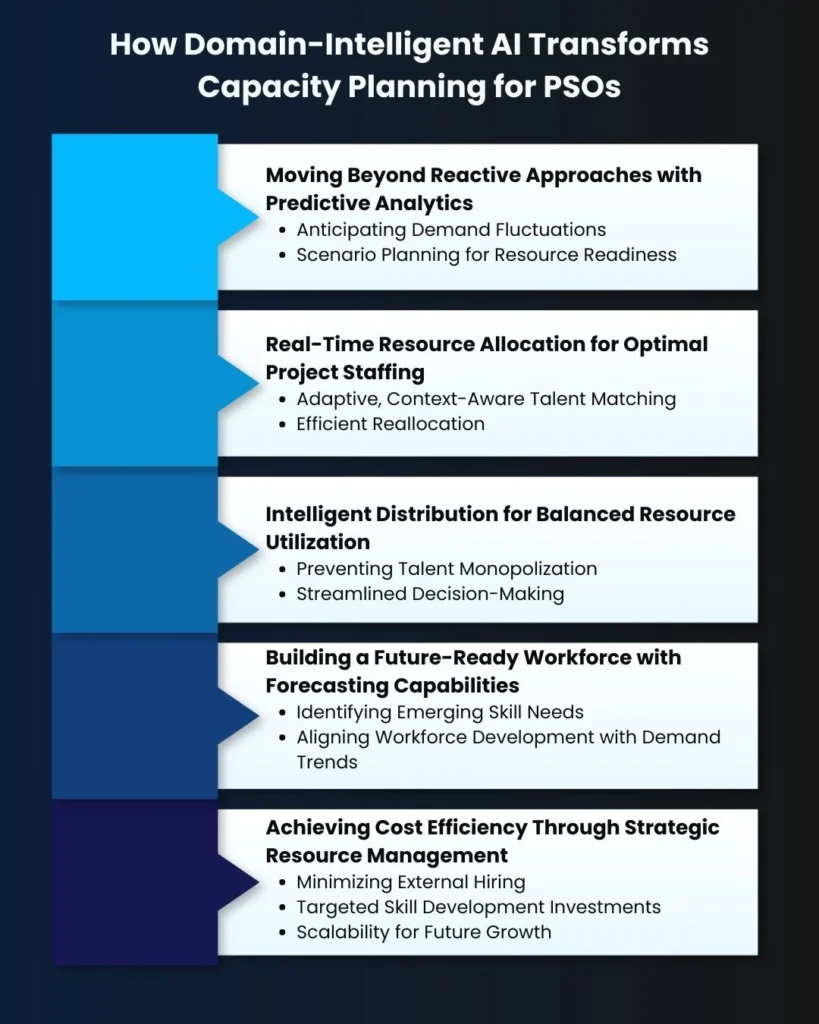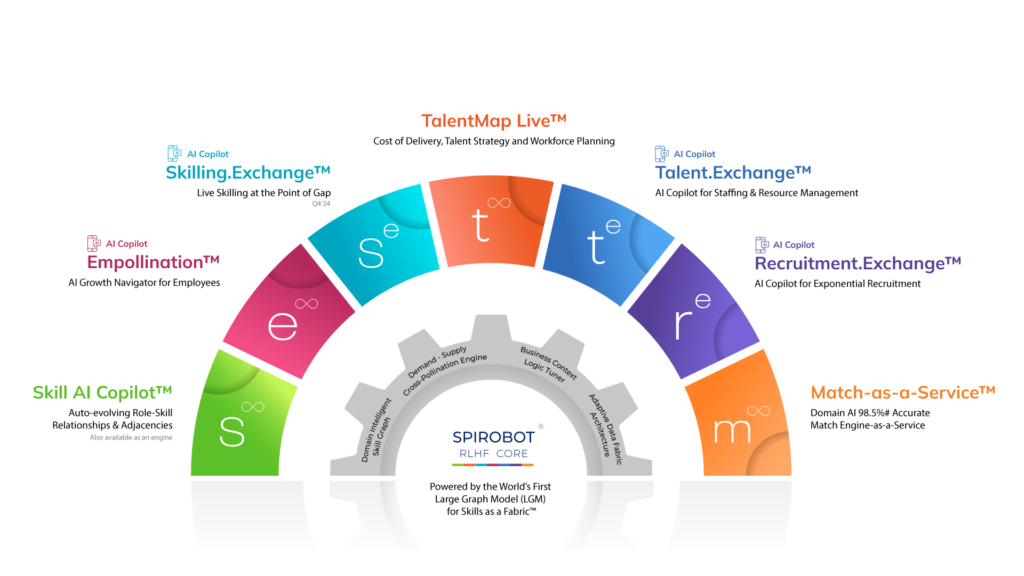Professional Services Organizations (PSOs) operate in an environment where resource management directly impacts project outcomes, profitability, and client relationships. Capacity planning—forecasting and adapting resource needs in real time—has emerged as a strategic priority for these organizations. By adopting Domain-Intelligent AI, PSOs can transform capacity planning from a reactive process into a predictive, proactive system that optimizes resources to meet complex, fluctuating demands.
This blog delves into how Domain-Intelligent AI specifically addresses capacity planning challenges in PSOs, enabling both efficiency gains and talent resilience in a highly competitive field.
Understanding the Capacity Planning Challenge in PSOs
Unlike industries with stable production flows, PSOs face constant variability in resource needs. Projects often demand specialized skills on short notice, leading to intense peak and workload valleys. Poor visibility into future demands exacerbates these challenges—41% of organizations cite difficulties in forecasting resource needs, leading to resource shortages and elevated operational costs. This fluctuating demand calls for sophisticated capacity planning tools that can forecast resource requirements with accuracy and agility.
41% of organizations cite difficulties in forecasting resource needs, leading to resource shortages and elevated operational costs.
How Domain-Intelligent AI Transforms Capacity Planning for PSOs
Capacity planning is a crucial, complex task for Professional Services Organizations (PSOs) that involves accurately forecasting resource needs, optimizing workforce distribution, and ensuring project demands are met promptly. Domain-Intelligent AI brings a new dimension to this process by embedding contextual intelligence into every step of capacity planning. It turns it from a reactive task into a proactive, data-driven function that can adapt seamlessly to dynamic project demands.
What is Capacity Planning?Capacity planning is the strategic process of forecasting and aligning an organization’s resources, particularly workforce skills and availability, with project demands to ensure efficient, timely project execution. It involves optimizing resource allocation to meet current and future needs, minimizing idle time, and avoiding resource shortages.
Moving Beyond Reactive Approaches with Predictive Analytics
- Anticipating Demand Fluctuations: Traditional capacity planning often reacts to immediate needs, but Domain-Intelligent AI anticipates future demands by analyzing historical trends, market shifts, and internal workforce data. This proactive approach allows PSOs to see demand patterns before they materialize, providing the foresight to prepare the workforce for upcoming projects.
- Scenario Planning for Resource Readiness: With advanced analytics, Domain-Intelligent AI enables scenario planning to test various resource deployment strategies. PSOs can simulate potential project expansions, overlapping deadlines, and other variables to understand how these changes might impact resource requirements, allowing for better preparation and avoiding last-minute bottlenecks.
Real-Time Resource Allocation for Optimal Project Staffing
- Adaptive, Context-Aware Matching: Domain-Intelligent AI elevates resource allocation by considering a deeper context around each project’s needs. It dynamically matches talent to projects based on skill relevance, past project experience, and real-time availability, ensuring each project is staffed with the right expertise.
- Efficient Reallocation: In fast-paced environments, where priorities can shift overnight, Domain-Intelligent AI supports real-time resource reallocation, quickly responding to urgent project needs. This ensures resources are not underutilized or overstretched, maintains balance across projects, and enables PSOs to maintain productivity without compromising project timelines.
Intelligent Distribution for Balanced Resource Utilization
- Preventing Talent Monopolization: Domain-Intelligent AI prevents critical resources from being monopolized by single projects, allowing for a fair, balanced distribution across all high-priority demands. This intelligent distribution means that despite several projects requiring similar expertise, resources are allocated to prevent other projects from suffering.
- Streamlined Decision-Making: Using data-driven intelligence to prioritize resource allocation, Domain-Intelligent AI reduces guesswork and manual intervention, enabling faster, more efficient planning. Decision-makers can rely on intelligent recommendations to optimize resource utilization and ensure each demand is met with the best match.
Building a Future-Ready Workforce with Forecasting Capabilities
- Identifying Emerging Skill Needs: By examining internal and external data, Domain-Intelligent AI forecasts which skills will be essential in the future. This capability allows PSOs to address potential skill gaps through reskilling, upskilling, or strategic hiring, building a proactive talent pipeline ready to meet evolving demands.
- Aligning Workforce Development with Demand Trends: The Domain-Intelligent AI forecasting capabilities guide workforce development initiatives, ensuring training investments are directed towards high-impact areas supporting future capacity needs. This alignment helps PSOs reduce reliance on external hiring by cultivating internal talent primed to meet anticipated project requirements.
Achieving Cost Efficiency Through Strategic Resource Management
- Minimizing External Hiring: Domain-Intelligent AI reduces the need for costly external hires by improving internal resource utilization, allowing PSOs to optimize workforce capacity from within. With resources deployed most efficiently, organizations can control costs more effectively.
- Targeted Skill Development Investments: With real-time visibility into skill gaps and workforce needs, Domain-Intelligent AI ensures training budgets are allocated to critical skills that will significantly impact capacity. This targeted approach ensures that the workforce remains adaptable without overspending on unnecessary training initiatives.
- Scalability for Future Growth: As PSOs grow and take on more extensive project portfolios, Domain-Intelligent AI scales alongside them, automating many aspects of capacity planning. This allows organizations to handle increased demand without losing operational efficiency, enabling them to scale sustainably.
Integrating Domain-Intelligent AI with Workforce Optimization
Workforce optimization is about more than just filling seats—it’s about placing the right talent in the right roles at the right time. Domain-intelligent AI enhances this process through its capacity to understand nuanced skill relationships, predict where skills may be transferrable, or identify alternative staffing options. This is particularly valuable in high-skill environments like PSOs, where specialized knowledge is essential but often in limited supply.
With Domain-Intelligent AI, PSOs can elevate capacity planning into a more strategic exercise, reducing reliance on costly external hires by maximizing internal mobility through enhanced talent visibiltiy. The system’s deep industry understanding helps pinpoint which internal resources can adapt to new projects, allowing for targeted training or reskilling initiatives that align the workforce with client needs.
Spire.AI: Transforming Workforce Capacity Planning for PSOs with Domain-Intelligent AI
Professional Services Organizations (PSOs) face unique workforce planning challenges that require precision, adaptability, and foresight. Spire.AI, with its Domain-Intelligent AI, provides a comprehensive solution for capacity forecasting, resource alignment, and talent pipeline management, enabling PSOs to keep pace with dynamic project demands.
A Foundation for Precision: The Large Graph Model (LGM) for Skills
- The Large Graph Model (LGM) for Skills, built on years of cross-industry research, is at the core of the Spire.AI capacity planning framework.
- This advanced model maps complex relationships between skills, roles, and adjacent capabilities, providing PSOs with unparalleled insights to align workforce capabilities precisely with project requirements.
- Unlike traditional systems, which often focus only on surface-level skills, LGM for Skills ensures that deeper, contextual skill relationships are understood and applied, fostering an adaptive workforce responsive to change.
Large Graph Model for Skills
The Large Graph Model (LGM) for Skills maps complex relationships between skills, roles, and adjacent capabilities, providing PSOs with unparalleled insights to align workforce capabilities precisely with project requirements.
Optimizing Demand Fulfillment: The Blue Ring Anti-Starvation Algorithm
- In conventional workforce planning, a “false sense of fulfillment” can occur, where resources appear assigned but are not truly aligned with project critical demands. Spire.AI tackles this challenge with the Blue Ring anti-starvation algorithm.
- The Blue Ring algorithm intelligently balances talent across competing demands, preventing high-priority resources from being monopolized by a single need. This ensures that all demands are met without leaving any projects underserved.
- By evenly distributing resources, the Blue Ring algorithm minimizes delays, reduces bottlenecks, and ensures that every demand is fulfilled to the best extent possible, enhancing project efficiency and client satisfaction.
The Blue Ring Anti-Starvation Algorithm
The Blue Ring algorithm intelligently balances talent across competing demands, preventing high-priority resources from being monopolized by a single need. This ensures that all demands are met without leaving any projects underserved.
The Blue Ring algorithm intelligently balances talent across competing demands, preventing high-priority resources from being monopolized by a single need. This ensures that all demands are met without leaving any projects underserved.
Moving from Reactive to Proactive: Predictive Capacity Forecasting
- With its predictive capacity forecasting capabilities, Spire.AI empowers PSOs to shift from reactive to proactive workforce planning.
- Forecasting Future Needs: Leveraging historical data, real-time insights, and market trends, Spire.AI Domain-Intelligent AI anticipates upcoming talent needs with high accuracy.
- Building a Strategic Talent Pipeline: By identifying emerging skill requirements early, PSOs can strategically plan for reskilling, upskilling, and hiring, ensuring a continuous supply of relevant talent.
- This approach allows organizations to reduce reliance on last-minute external hiring and develop a robust, ready-to-deploy talent pool that aligns with evolving project demands.
Continuous Talent Pipeline Optimization with Business Context Logic and Multi-Algorithm Matching
- Spire.AI integrates Business Context Logic (BCL) and the Algorator™ multi-algorithm matching engine to enhance workforce agility further, matching employee skills to current and anticipated project needs.
- Career Development and Role Evolution: Spire.AI technology promotes internal mobility by aligning employee skills with longer-term organizational goals, supporting natural career progression, and reducing talent turnover.
- Efficient Internal Resource Utilization: With a match accuracy of 98.5%, Spire.AI enables PSOs to maximize internal talent resources, minimize bench time, and lower dependency on costly external hires.
Enabling Comprehensive Workforce Planning and Talent Pipeline Building
Spire.AI Domain-Intelligent AI serves as an all-encompassing tool for PSOs, bringing together:
- Forecasting: Accurate prediction of skill needs based on data-driven insights.
- Capacity Planning: Dynamic, real-time resource alignment to meet immediate project requirements.
- Talent Pipeline Building: An organized, future-focused strategy that ensures the availability of critical skills for both current and future needs.
Conclusion
Domain-Intelligent AI represents a paradigm shift in capacity planning, providing PSOs with the ability to anticipate, allocate, and adapt resources in previously unattainable ways. By transforming capacity planning into a proactive function, Domain-Intelligent AI enables PSOs to optimize resource allocation, control operational costs, and maintain service quality despite fluctuating demands. The Spire.AI auto-evolving framework furthers this capability, empowering PSOs to stay agile and aligned with employee and client expectations.
In an industry defined by its need for precision and adaptability, Domain-Intelligent AI offers PSOs the tools to meet and exceed these demands, ensuring that resource efficiency is not just an operational goal but a competitive advantage.







